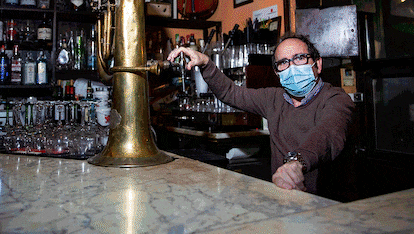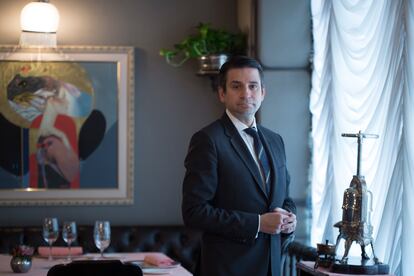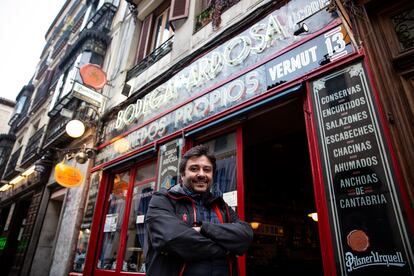Spain’s bars and restaurants confront their darkest hour
Ten of the country’s 17 regions have shut food and drink venues in a bid to contain the coronavirus, while 290,000 workers remain on furlough. Owners are pleading for direct aid to avoid going under

Spain’s hospitality sector, which is taking the brunt of the economic effects of the coronavirus pandemic, now faces its toughest months since the country emerged from its first state of alarm in June. Between the start of the summer and the third wave of the pandemic, there were certain restrictions in place, but the vast majority of establishments were still able to stay open. Now, with the post-Christmas surge in Covid-19 cases filling hospitals’ intensive care units, the authorities have once again been obliged to crack down. “The sector is in ruins, we are closed in half of Spain,” notes José Luis Yzuel, president of the hospitality business association Hostelería de España.
Ten of the country’s 17 regions have shut their bars and restaurants – with the exception of several low-incidence municipalities – and allow only home delivery, while the remaining seven regions, as well as the North African exclave cities of Ceuta and Melilla, have brought forward closing times, eliminating dinner service – one of the sector’s mainstays.
To cope with its losses, the industry is demanding an injection of non-refundable cash. “We need direct aid that will allow us to stay afloat; getting into debt is not the solution,” says Yzuel. The latest response from the government came in December in the form of a rescue plan that included rent reductions, access to financing, and cuts in taxes and Social Security contributions, but it was a far cry from what the sector is demanding. Yzuel does recognize that some regional governments have offered direct aid, but not as much as the companies are requesting. “We need an injection of funds similar to what some European countries have done – €10,000 the first month, and a percentage of turnover in the following months.”
Around 363,000 people’s livelihoods depend on the sector’s recovery. This figure is the total number of the industry’s employees who are still on the government’s ERTE furlough scheme. They account for nearly half of the total number of workers in Spain who are still on ERTEs. It does not include the 400,000 jobs that were altogether lost in the hostelry sector during 2020, most of them, 267,000, in restaurants.
The last three months of the year had a particularly devastating impact on employment due to the tightening of restrictions during the second wave of the pandemic. Catalonia, Navarre, Asturias, the Basque Country and Castilla y León introduced a total closure of bars and restaurants, and the resulting economic impact gives us some indication of what we can expect from the January restrictions. Asturias closed bars and restaurants for 40 days between November and mid-December and only allowed home delivery. According to data from the Spanish Federation of Hotel and Restaurant Catering Distribution Companies (Fedishoreca), barely 3% of establishments were open during that period and sales fell by 98% in the region. In the Basque Country, closures ran to 90% and revenue fell by the same figure.
These losses are much higher than the national average in 2020, when sales dropped 42% from 2019. The current slump has so far led to the closure of one in five businesses – around 60,000, according to José Manuel Fernández, director of Fedishoreca. The consulting firm Dipcom estimates that 75,000 companies in the sector either went under or changed hands in the past year, a dramatic situation that will continue in 2021, with estimated closures of between 25,000 and 50,000 businesses.
Four restaurateurs told EL PAÍS what it means to face new restrictions after 10 months of the pandemic.
Open for card games
Café Bar Viaducto | Madrid
“These days I open for the sake of opening,” says Carlos Lloret. That’s not just a figure of speech, it really is the case: during the first two days of the new restrictions, he has had just seven customers – his friends, who come to play cards to keep him company. He has been running the Viaducto bar for the past 21 years – a bar just a stone’s throw from the Royal Palace in Madrid and that used to open at the time it now has to close. “Those of us who either don’t have outdoor seating or don’t open in the mornings are essentially dead,” he says. Since March, there hasn’t been a month when Lloret has covered his expenses and, until last week, he was making “even less” than just 20% of what he made last year.

Just when he thought things couldn’t get any worse, the Madrid region moved closing time forward from 11pm to 9pm. Traditionally, Lloret’s bar would attract people coming out of the restaurants in the area as well as young people who were out in La Latina. But that’s all gone by the wayside. With the new opening hours, his friends suggested he should reinvent himself and start serving snacks at noon. “After 20 years doing the same thing? Do I start serving vermouth? Do I start a kitchen service? Reinventing yourself sounds great, but I’m not an inventor,” he says.
The surrounding businesses are just as badly off or worse, says Lloret, who survives thanks to his savings and the fact that he has no employees to support. He does the math and, of six businesses in the vicinity, four “are going down the drain” and the other two have already closed.
Asked for his opinion about the coming months, Lloret sounds pessimistic but resigned. “I do better in winter than in summer, but I’ve just had the worst Christmas I can remember,” he says. Bars in the area depend a lot on the local fiestas of San Isidro and La Paloma, held in the months of May and August, so 2021 is looking to be a complicated year as well.
No exceptions for luxury dining
Restaurante Via Veneto | Barcelona
Pere Monje runs the Michelin-starred Via Veneto restaurant in Barcelona. He opened the premises in 1967 and in all this time he had never experienced restrictions like the ones imposed in 2020 and 2021. “A restaurant reflects the economic level of society,” says Monje. “At Via Veneto, we have weathered the oil crisis and the 2008 crisis. We have had difficult times, but also fantastic times.” But the crisis triggered by the coronavirus is unprecedented.

“This crisis is very different because, for the first time, we have had opening restrictions imposed on us,” he explains. “Some of them are extremely tough. From the start, both at management level and as a team, we have tried to respond, knowing that it was impossible to make forecasts and that it was very important for the whole team to adapt.”
The Via Veneto transitioned from a strict lockdown at the beginning of the pandemic to almost normal hours, only to end up with the current situation in which there are no dinners – just lunches from 1pm to 3.30pm. “We have been adapting to the regulations and we have noticed that our regular clients have shown a lot of loyalty in these complicated times,” says Monje. “The pandemic has prompted us to add takeaway to our services, something that used to be considered very informal but which we have also adopted as a philosophy.”
In more normal times, the Via Veneto had a midday clientele which was more business-oriented and a dinner clientele that consisted mostly of couples and groups. But the latter can no longer dine here. “Even so,” says Monje, “we will continue to pour our energy into our work and give the best service to the customer. We have adapted our restaurant, we ionize the rooms daily [which disinfects the air] and the entire team is subject to regular PCR tests to make our customers feel at home.” Via Veneto has also had to resort to the ERTE furlough scheme, but is confident that the situation will soon be much more bearable for everyone.
“Selling four coffees to go doesn’t pay off”
Cafetería Paradiso | Santiago de Compostela
Agustín Ares has been running the Cafetería Paradiso for 29 years. This establishment with almost half a century of history lies in the heart of the old quarter of Santiago de Compostela, in the northeastern region of Galicia just 250 meters from Obradoiro square. Anyone strolling around the outside of the cathedral will notice its green doors with glass panels. The location once helped make it a go-to destination for Camino de Santiago pilgrims wandering the narrow streets of this part of the Galician capital. But today it is empty.
Ares, 60, runs the cafeteria with his wife and his son Pablo, 28. They reopened in June, at the end of the national lockdown, closed again in October when restrictions were imposed again in Santiago, reopened in December, and then closed again in January as they waited for a permit for a sidewalk seating area. On January 8, they set up the tables outside and then Galicia imposed the toughest restrictions since the first wave. El Paradiso will not open again until February 17: “Selling four coffees to go doesn’t pay off,” he says.
Ares is not sure how things will turn out. “This year will be complicated,” he says. “If it were just the country that was in bad shape, we’d roll up our sleeves and rise above it. But it’s not, it’s the whole world. There are no visitors, no pilgrims.” While tourism is essential to the city’s economy, the fact locals are staying away too is exacerbating the situation. “There are regulars who don’t come now, elderly people who prefer to stay at home,” he says. However, Ares chooses to see his glass half full, despite the cloud of uncertainty hovering over him, pointing out that he has managed to keep going until now. But if the situation does not improve, he’s not sure what he’ll do. “Being a family business, it’s part of you. In the hospitality sector we were born to work.”
“We’d never been closed for so long. Not even during the Civil War”
Bodega de la Ardosa | Madrid
Bodega de la Ardosa, one of 12 bars in the capital over 100 years old, first opened in 1892 yet it has never experienced a year like 2020. “This place lived through the Civil War and the flu pandemic of 1918, but it had never been closed for so long. It’s been almost four months,” says Víctor Díaz, the Ardosa’s manager.

Bringing forward the closing time to 9pm has meant no more dinner service, one of the cornerstones of the business, according to Díaz. If losses amounted to between 70% and 80% of revenue up to now, the new restrictions imposed last Monday has pushed this to its limit. “The first day with the new hours, we made half of what we did the previous Monday,” he says.
Due to the narrow sidewalks, the lack of parking space and the fact that the venue is located in an acoustic protection zone, the Bodega de la Ardosa is unable to set up outdoor seating, which has become essential to weathering the crisis. “Right now, people are really thinking twice about going into closed spaces and that has especially hurt the small premises,” he says. How to get out of the predicament, then? “The solution is to avoid getting deeper into debt; the solution is direct aid, an amount based on the previous year’s turnover,” he says.
Díaz recognizes that Madrid is not among the regions with the severest restrictions on hospitality, and that there are those who are even worse off. But he does fear that things will get uglier in the coming weeks: “Dear Lord, please let things stay the way they are!” he says.